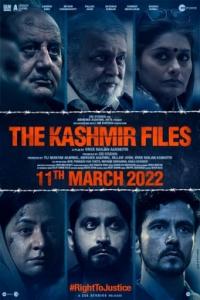Creation and Criticism
ISSN: 2455-9687
(A Quarterly International Peer-reviewed Refereed e-Journal
Devoted to English Language and Literature)
Vol. 07, Joint Issue 24 & 25: Jan-April 2022

Film Review
The Kashmir Files: Shades of Realities
The Kashmir Files. Directed by Vivek Agnihotri. Starring: Mithun Chakraborty, Anupam Kher, Darshan Kumar, Pallavi Joshi, Chinmay Mandlekar,Bhasha Sumbli. Production Companies: Zee Studios. Release Date: 11 March 2022. Running Time: 170 minutes
Reviewed by Jagdish Batra
Kashmir as a trouble spot has caught the attention of the people as have other such regions elsewhere in the world. However, due to large-scale dissemination of motivated information, a distorted picture has come to exist in public mind. The focus is by and large, hogged by the perpetrators of terror behind the smokescreen of “human rights” which are not allowed to the victims. Vivek Agnihotri, as the writer-director of the movie The Kashmir Files has done a commendable job in bringing to the centrestage what had remained a side issue in the power politics in India.
The story begins with the menacing knock by terrorists on the door of the house belonging to the Kashmiri Hindu Pandit Pushkar Nath (played by Anupam Kher), a teacher, followed by the murder of his son Karan in front of latter’s wife and daughter because he was alleged to be “an Indian spy”. The killer Bitta turns out to be Pushkar’s student only! To add insult to injury, the terrorist Bhatt forces wife to eat the grains mixed with her husband’s blood! This might seem too weird but that is what Kashmir was in the 1990s when Mufti Mohammad Syed was the Home Minister at the centre and Farooq Abdullah the state Chief Minister.
As the time-frame shifts in this forward-backward narrative, the spotlight focusses on Pushkar’s grandson Krishna (played by Darshan Kumar) studying in a renowned university in Delhi. He was told that his parents had died in an accident. At the university, we come across another teacher Radhika (played by Pallavi Joshi), who is hand-in-glove with Bitta and actively advances the agenda of Kashmiri separatists. She mentors Krishna to fight the election for presidentship of the students union. The prescription provided by her to Krishna is to concoct a narrative of victimhood of Kashmiri Muslims because this will emotionally appeal to the young voters, and besides, “this is politics”!
Krishna had been unaware of reality in Kashmir until his grandfather died and he had to take the ashes to their ancient home – now reduced to rubble – in Srinagar as per wishes of the grandfather. He reaches Brahmha’s house where, as per the deceased’s wish, his old friends, now retired from service, have also gathered – a top bureaucrat (Mithun Chakravorty), a state police chief (Puneet Issar), a scribe (Atul Shrivastav), and a doctor (Prakash Belawadi). They were around when Krishna’s other family members were killed but had vowed not to tell him anything as the elders have always thought of not giving pain to their young children, but as the interaction progresses, things take a different turn and they have to reveal it all.
The atmosphere of terror that prevailed in the 1990s has been graphically captured in the movie. “Raliv, galiv, chaliv” (Convert to Islam, leave Kashmir or die) was the slogan being raised at that time. The hospital doctors were warned against treating “kafir” patients. The body of a murdered Pandit is seen hanged on a tree. The graffiti called upon the Pandit community to leave the valley without their women, showing the ulterior intentions of the terrorists. Many Kashmiri Pandits were murdered and women raped. The hapless victims are still leading the life of refugees in pitiable conditions in other parts of the country. The movie informs that this forced exodus is, as per history, the seventh. The large-scale execution of Kashmiri Pandits by the Afghan warlord Durrani during 18th century had left its mark on an island in the Dal lake. The site is called Battmazar and there is reference to it in the movie. Incidentally, this is also referred to by the novelist Rajat Mitra in his Kashmir-based novel The Infidel Next Door. In this sordid scenario, no values guide the terrorists who have been brainwashed by the enemy country and are so steel-hearted that they won’t mind killing their own parents if it were ordered, as per Bitta’s confession in a TV interview.
The movie deals with the negative role played by the self-serving politicians who are hand-in-glove with the terrorists, an illustration of which is provided in the scene where Bramha goes to report to the chief minister and finds a gun-toting terrorist there. The movie is also a comment on some academics like Professor Radhika. She had motivated Krishna to meet her contact in Srinagar to get “answers to all his questions” and who turns out to be the self-same terrorist Bitta. His pictures with the teacher showcased in his hideout reveal their collusion. Bitta, for a while, is able to persuade Krishna that his is a peaceful Gandhian movement and that Krishna’s parents were killed by Indian army. However, the news clippings of terror acts of past related to the murder of his family at the hands of terrorists in army fatigue contained in the Kashmir files open his eyes to reality. The consequent speech by Krishna in front of students is a fine piece of oratory in which he recounts the glory of old Kashmir and the successive onslaughts on its culture by invaders, culminating in the recent genocide because of which the Kashmiri Pandits had to flee the valley.
The movie is, thus, an attempt to give a peep into the problem of displacement of the Kashmiri Pandit community and is a fine piece of historical realism. Incidents like the attack by terrorists in army outfit is also mentioned in Arundhati Roy’s The Ministry of Utmost Happiness even though, true to her political views, she has given it alongside an opposite version. The boat journey to the terrorist’s hideout also seems to have been inspired by this novel. However, the movie makes use of only the necessary scenes of violence and is, therefore, not a melodrama. We find the use of Kashmiri songs and lullabies at appropriate places, which makes the movie very touching and an authentic piece dealing with Kashmiri culture and lifestyle and the issues impacting it in the recent historical context.
About the Reviewer:
 Dr. Jagdish Batra is serving as Professor of English at O.P. Jindal Global University, Sonepat, Haryana. A Rotary International scholar to USA, he has also published more than 60 research papers in leading research journals, and nine books. He may be contacted at drjagdishbatra@gmail.com.
Dr. Jagdish Batra is serving as Professor of English at O.P. Jindal Global University, Sonepat, Haryana. A Rotary International scholar to USA, he has also published more than 60 research papers in leading research journals, and nine books. He may be contacted at drjagdishbatra@gmail.com.


